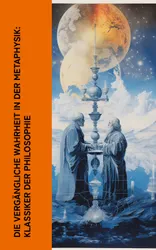Georg Wilhelm Friedrich Hegel's "Science of Logic" stands as a monumental work in the realm of philosophy, intricately exploring the nature and development of thought itself. Employing a dialectical method, Hegel meticulously constructs a framework where concepts evolve through contradictions, ultimately revealing a profound interconnectivity in human reasoning. His literary style is characterized by dense, systematic exposition and a commitment to uncovering the underlying structures of ideas, positioning this text as a cornerstone of German Idealism and a precursor to later existential thought. Hegel, an influential figure born in 1770, was immersed in the intellectual currents of his time, including Kantian philosophy and the tumultuous socio-political landscape of post-revolutionary Europe. His experiences as a student and teacher, coupled with his engagement in the philosophical debates of his era, significantly shaped his thought processes. Through "Science of Logic," Hegel aimed to elucidate the mechanistic progression of logical categories, providing a rigorous foundation for subsequent philosophical inquiry and laying the groundwork for metaphysical exploration. This distinguished text is highly recommended for readers seeking to grasp the intricacies of Hegelian philosophy. It invites scholars, students, and philosophy enthusiasts alike to engage with the dialectical method, enhancing their understanding of not only logic but also the nature of philosophical inquiry itself.

Líneas fundamentales de la filosofía del derecho : o compendio de derecho natural y ciencia del Estado
Georg Wilhelm Friedrich Hegel
book
Wissenschaft der Logik
Georg Wilhelm Friedrich Hegel
book
Phänomenologie des Geistes
Georg Wilhelm Friedrich Hegel
book
50 Meisterwerke der Philosophie : Metaphysik, Das Gastmahl, Bhagavadgita, Tractatus logico-philosophicus, Kritik der reinen Vernunft, Also sprach Zarathustra, Selbstbetrachtungen von Marcus Aurelius
Ludwig Wittgenstein, Edmund Husserl, Karl Marx, Søren Kierkegaard, Friedrich Nietzsche, Ralph Waldo Emerson, John Stuart Mill, Georg Wilhelm Friedrich Hegel, Friedrich Schelling, Johann Gottlieb Fichte, Immanuel Kant, John Locke, Montesquieu, Jean Jacques Rousseau, David Hume, Gottfried Wilhelm Leibniz, Baruch Spinoza, Konfuzius, Laotse, Platon, Xenophon, Aristoteles, Marcus Tullius Cicero, Seneca, Epiktet, Marc Aurel, Plotin, Thomas von Aquin, Nicolaus von Cues, Erasmus von Rotterdam, Niccolò Machiavelli, Tommaso Campanella, Martin Luther, Giordano Bruno, Samuel von Pufendorf, Abbé Castel de Saint-Pierre, Michel de Montaigne, René Descartes, Francis Bacon, Blaise Pascal
book
Vorlesungen über die Geschichte der Philosophie IV : Nachschriften zu dem Kolleg des Wintersemesters 1827/28
Georg Wilhelm Friedrich Hegel
book
Vorlesungen über die Philosophie der Natur IV : Anhang
Georg Wilhelm Friedrich Hegel
book
Hegel: Lectures on Philosophy : The Philosophy of History, The History of Philosophy, The Proofs of the Existence of God
Georg Wilhelm Friedrich Hegel
book
The Collected Works of Georg Wilhelm Friedrich Hegel
Georg Wilhelm Friedrich Hegel
book
Meisterwerke der Weltphilosophie : Das Gastmahl, Nikomachische Ethik, Also sprach Zarathustra, Utopia, Phänomenologie des Geistes, Neues Organon, Selbstbetrachtungen
Immanuel Kant, Søren Kierkegaard, Edmund Husserl, Ludwig Wittgenstein, Friedrich Nietzsche, Konfuzius, Platon, Xenophon, Aristoteles, Laotse, Marcus Tullius Cicero, Marcus Aurelius, Plotin, Thomas von Aquin, Niccolò Machiavelli, Thomas Morus, Giordano Bruno, Michel de Montaigne, René Descartes, Francis Bacon, Blaise Pascal, Baruch Spinoza, Gottfried Wilhelm Leibniz, David Hume, Jean Jacques Rousseau, Friedrich Schelling, John Locke, Georg Wilhelm Friedrich Hegel, John Stuart Mill, Karl Marx
book
Die vergängliche Wahrheit in der Metaphysik: Klassiker der Philosophie : Metaphysische Anfangsgründe der Naturwissenschaft, Träume eines Geistersehers, Grundzüge der Philosophie, Götzen-Dämmerung
Platon, Aristoteles, Plotin, Thomas von Aquin, René Descartes, Baruch Spinoza, Thomas Hobbes, Immanuel Kant, Gottfried Wilhelm Leibniz, Friedrich Wilhelm Joseph Schelling, Georg Wilhelm Friedrich Hegel, Arthur Schopenhauer, Moses Mendelssohn, Friedrich Nietzsche, Rudolf Steiner
book
Metaphysik: Zwischen flüchtiger Wahrheit und ewiger Suche : Meisterwerke der Philosophie: Metaphysische Anfangsgründe der Naturwissenschaft, Träume eines Geistersehers, Grundzüge der Philosophie, Götzen-Dämmerung
Platon, Aristoteles, Plotin, Thomas von Aquin, René Descartes, Baruch Spinoza, Thomas Hobbes, Immanuel Kant, Gottfried Wilhelm Leibniz, Friedrich Wilhelm Joseph Schelling, Georg Wilhelm Friedrich Hegel, Arthur Schopenhauer, Moses Mendelssohn, Friedrich Nietzsche, Rudolf Steiner
book
Die größten Klassiker der Philosophie : Also sprach Zarathustra, Utopia, Phänomenologie des Geistes, Neues Organon, Selbstbetrachtungen, Das Gastmahl, Nikomachische Ethik
Immanuel Kant, Søren Kierkegaard, Edmund Husserl, Ludwig Wittgenstein, Friedrich Nietzsche, Konfuzius, Platon, Xenophon, Aristoteles, Laotse, Marcus Tullius Cicero, Marcus Aurelius, Plotin, Thomas von Aquin, Niccolò Machiavelli, Thomas Morus, Giordano Bruno, Michel de Montaigne, René Descartes, Francis Bacon, Blaise Pascal, Baruch Spinoza, Gottfried Wilhelm Leibniz, David Hume, Jean Jacques Rousseau, Friedrich Schelling, John Locke, Georg Wilhelm Friedrich Hegel, John Stuart Mill, Karl Marx
book
